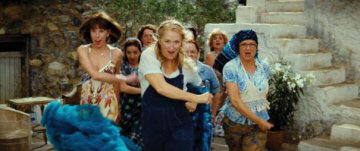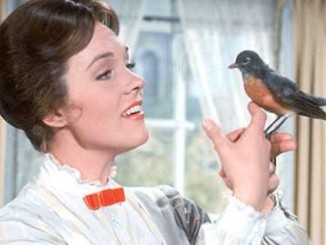 Sophie (Amanda Seyfried) has spent her life growing up on a small Greek island with her single mother Donna (Meryl Streep). Never knowing who her father is, she gets it into her head to snoop in her father’s diary for the answer. Surprised to find a trio of possible candidates (Colin Firth, Pierce Brosnan and Stellan Skarsgard), she impulsively invites all three to her upcoming wedding, convinced that when she sees them she’ll be able to identify her father on sight. Of course, she keeps her plan a secret from her mother, who promptly discovers them upon their arrival.
Sophie (Amanda Seyfried) has spent her life growing up on a small Greek island with her single mother Donna (Meryl Streep). Never knowing who her father is, she gets it into her head to snoop in her father’s diary for the answer. Surprised to find a trio of possible candidates (Colin Firth, Pierce Brosnan and Stellan Skarsgard), she impulsively invites all three to her upcoming wedding, convinced that when she sees them she’ll be able to identify her father on sight. Of course, she keeps her plan a secret from her mother, who promptly discovers them upon their arrival.
Such is the borderline screwball setup that propels the screwball plot of Mamma Mia!, the big screen adaptation of the hit Broadway musical built around the pop hits of the 1970s Swedish vocal group ABBA. Don’t look for much more than that here. The first sentence of this paragraph is more complex than the film’s plot.
The main structural problems with the film stem back to the Broadway original’s basic conceit. In nearly all musicals, the songs spring out of the context of the scenes they are a part of, illuminating characters’ emotions and helping to advance the plot. Here, the plot is beholden to the pre-existing songs, and there are several instances where one can feel the screenplay being hammered to fit around the tunes. This is especially glaring with a few songs whose inclusion seems predicated only on their status as well-loved hits.
Perhaps these flaws carried over through the office of the film’s director Phyllida Lloyd, the director of the stage version. A first time feature director, Lloyd doesn’t make good use of the language of cinema, leaving many of the musical numbers looking flat and unengaging. What life these numbers do manage to contain subsists totally on the production value in the music and the songs’ inherent catchiness.
 The cast tries as gamely as they can with the material they have. Streep surprises with a fairly respectable vocal performance, even if her portrayal of Donna vaguely echoes her work in Postcards From The Edge. On the other edge of the spectrum is Pierce Brosnan, whose singing voice could charitably be described as barely passable. This is surprising as his role is the strongest of the three potential fathers, with the most singing required. While he can be good in both action and comedy films, the requirements of the role put him over his head here.
The cast tries as gamely as they can with the material they have. Streep surprises with a fairly respectable vocal performance, even if her portrayal of Donna vaguely echoes her work in Postcards From The Edge. On the other edge of the spectrum is Pierce Brosnan, whose singing voice could charitably be described as barely passable. This is surprising as his role is the strongest of the three potential fathers, with the most singing required. While he can be good in both action and comedy films, the requirements of the role put him over his head here.
Somewhere between these two extremes lies Seyfried, who sports a decent enough voice, but who overacts in some scenes as if she is on stage trying to project to the back row of a theatre audience rather than in a movie. Firth is stuck playing yet another variable on his usual hapless romantic-comedy character while Skarsgard’s character, perhaps the most interesting of the three potential fathers, all but disappears into the background of the film for long stretches of time.
If there is a true bright spot to be found in the movie its in the performances of Christine Baranski and Julie Walters as Donna’s two old friends. Perhaps because both have extensive experience in film and on the stage, they are the cast members most capable of finding a middle ground between the two mediums.



